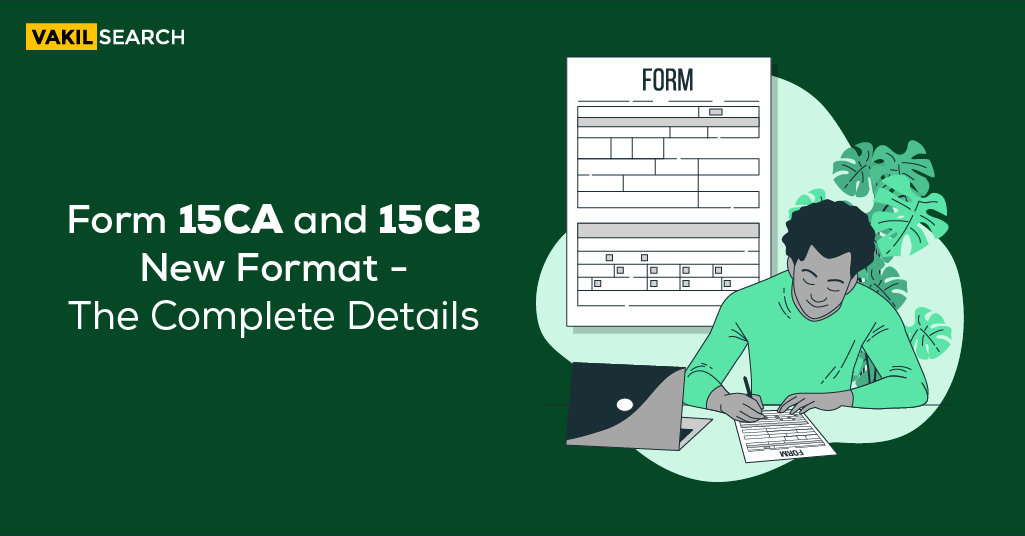Navigate the intricacies of Form 15CA and 15CB's new format, crucial for international transactions. Understand changes, avoid mistakes, and adopt efficient submission practices.
Form 15CA and 15CB New Format: Introduction
In the ever-evolving landscape of financial transactions, Form 15CA and 15CB play a pivotal role, especially for businesses engaged in international transactions. Recently, there have been updates to the format of these forms, and understanding these changes is crucial for compliance and smooth transactions. In this comprehensive guide, we will look into the details of the new format for Form 15CA and 15CB, providing businesses with the information they need for seamless international financial dealings.
Overview of Form 15CA and 15CB
Understanding the Purpose
Form 15CA and 15CB are statutory forms under the Income Tax Act of India, required for making remittances to non-residents. These forms are essential for ensuring that tax is deducted at the source and that the transaction adheres to Indian tax laws. Form 15CA is a declaration made by the remitter, while Form 15CB is a certificate issued by a chartered accountant.
Significance in International Transactions
Both forms play a crucial role in facilitating and regulating cross-border transactions. They help in tracking and ensuring that the appropriate taxes are deducted at the source, preventing tax evasion and promoting transparency in international financial dealings.
Changes in the New Format
Digital Transformation
One of the significant changes in the new format is the move towards digitisation. The revamped forms leverage technology to streamline the submission process, making it more efficient and reducing paperwork. This aligns with the broader trend of digital transformation in financial and regulatory processes.
Mandatory E-Filing
Under the new format, e-filing of Form 15CA and 15CB becomes mandatory. This shift to electronic filing not only enhances the speed of processing but also reduces the chances of errors associated with manual data entry. Businesses need to adapt to this digital requirement for compliance.
Detailed Analysis of Form 15CA
Particulars of Remitter and Recipient
The new format retains the need for detailed information about the remitter and the recipient. This includes names, addresses, and PAN (Permanent Account Number) or TAN (Tax Deduction and Collection Account Number) details. Ensuring accuracy in these particulars is crucial for avoiding discrepancies in the transaction process.
Nature of Remittance
The nature of remittance must be specified in the form. Whether it is for business transactions, salary, dividends, or any other purpose, this information helps in categorising the transaction correctly for taxation purposes.
Details of Tax Deduction
Form 15CA requires the remitter to provide details of the tax deduction under the relevant sections of the Income Tax Act. This includes the section under which tax is deducted, the rate of deduction, and the amount of tax deducted. Precision in providing these details is essential for compliance.
In-Depth Examination of Form 15CB
Certification by a Chartered Accountant
Form 15CB involves the certification of the transaction by a chartered accountant. The new format maintains this requirement, emphasising the need for professional validation of the transaction details. Chartered accountants play a crucial role in ensuring the accuracy and compliance of the information provided in Form 15CB.
Detailed Information on Remittance
The chartered accountant is responsible for verifying the details of the remittance, ensuring that it aligns with the provisions of the Income Tax Act. This includes a thorough examination of the purpose of remittance, the nature of the transaction, and the applicable tax rates.
Compliance with Double Taxation Avoidance Agreements (DTAA)
If the transaction is eligible for benefits under a Double Taxation Avoidance Agreement, the chartered accountant certifies the compliance with the terms of the agreement. This is a critical aspect, as it can impact the tax liability on the remittance.
Common Mistakes to Avoid
Incorrect Details
One of the most common mistakes is providing incorrect details in Form 15CA and 15CB. Inaccuracies in remitter and recipient information, nature of remittance, or tax deduction details can lead to delays and complications in the transaction process.
Non-Compliance with New E-Filing Requirement
Businesses must ensure that they adapt to the mandatory e-filing requirement for Form 15CA and 15CB. Failure to comply with this digital transformation can result in non-compliance with regulatory norms and potential penalties.
Lack of Professional Certification
Failing to obtain the required certification from a chartered accountant for Form 15CB can be a costly mistake. Professional validation is essential for ensuring that the transaction aligns with tax regulations and avoids legal complications.
Best Practices for Efficient Form Submission
Engage with Chartered Accountants
Collaborating with experienced chartered accountants is crucial for ensuring the accurate and compliant submission of Form 15CB. Their expertise in tax regulations and international transactions adds value to the certification process.
Leverage Technology Platforms
Explore technology platforms that facilitate the e-filing of Form 15CA and 15CB. These platforms often provide a user-friendly interface, ensuring that businesses can navigate the digital submission process with ease.
Regular Updates and Training
Stay informed about changes in tax regulations and the forms’ formats. Regular training sessions for relevant personnel ensure that they are well-versed with the latest requirements and can efficiently handle the submission process.
Future Trends and Adaptability
Integration with Financial Systems
The future of Form 15CA and 15CB may involve closer integration with businesses’ financial systems. This integration aims to streamline the extraction of transaction details and enhance accuracy in form submission.
Continued Emphasis on Digital Processes
As technology continues to advance, the emphasis on digital processes is likely to grow. Businesses should anticipate further updates to the forms’ format and be prepared to adapt to future digital requirements for financial transactions.
Conclusion
In conclusion, comprehending the new format of Form 15CA and 15CB is crucial for businesses involved in international transactions. The shift towards digital processes, mandatory e-filing, and the persistent emphasis on accurate information underscore the evolving nature of these forms. Businesses that remain informed about these changes, collaborate with professionals, and leverage technology are better equipped to navigate international financial transactions with efficiency and compliance.
Vakilsearch, a trusted partner specialising in legal and compliance solutions, plays a vital role in assisting businesses in adapting to these changes. Their expertise ensures that businesses stay compliant with regulatory requirements, particularly in the context of international financial dealings. Collaborating with Vakilsearch enhances the accuracy of form submissions, facilitates seamless integration with evolving digital processes, and contributes to the overall efficiency and compliance of businesses engaged in cross-border transactions.
FAQs on Form 15CA and 15CB
Why is understanding the new format of Form 15CA and 15CB crucial for businesses?
Understanding the new format is vital for businesses engaged in international transactions as it ensures compliance with evolving regulations, facilitating seamless cross-border financial dealings and preventing potential errors or delays in the submission process.
What role does digital transformation play in the recent updates to Form 15CA and 15CB?
The recent updates emphasise a shift towards digitisation, making e-filing mandatory. This digital transformation streamlines the submission process, reduces paperwork, and aligns with broader trends in financial and regulatory processes, enhancing efficiency and accuracy.
Why is professional certification by a chartered accountant essential in Form 15CB?
Chartered accountants play a crucial role in certifying Form 15CB, ensuring accuracy and compliance with the Income Tax Act. Their validation of transaction details is vital for preventing legal complications, especially in the context of international financial transactions.
How can businesses avoid common mistakes in the submission of Form 15CA and 15CB?
To avoid common mistakes, businesses must ensure accurate details in remitter and recipient information, nature of remittance, and tax deduction. Additionally, adapting to the mandatory e-filing requirement and obtaining professional certification from a chartered accountant are critical steps for compliance.
What role does Vakilsearch play in assisting businesses with Form 15CA and 15CB compliance?
Vakilsearch, a trusted legal and compliance solutions provider, plays a vital role in helping businesses adapt to changes in Form 15CA and 15CB. Their expertise ensures businesses stay compliant with evolving regulations, enhancing the accuracy of form submissions and contributing to overall efficiency and compliance in cross-border transactions.
Also, Read:










